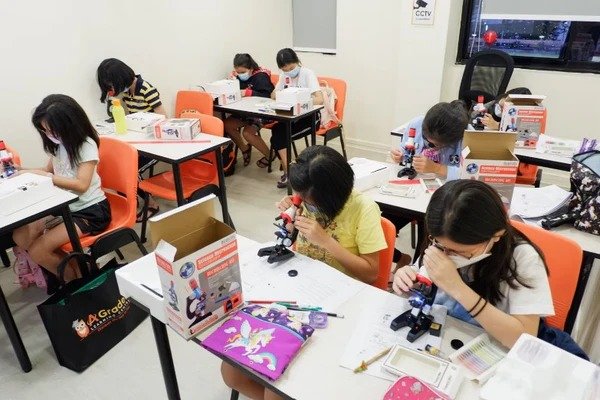Discovering the Spark: Top Science Tuition Centres for Primary Kids That Actually Make Learning Fun
As a parent, watching your child’s eyes light up over a simple experiment—like mixing baking soda and vinegar to create a mini volcano—feels like magic. But let’s be real: in today’s packed school curriculum, especially with science concepts piling up from Primary 3 onward, that spark can flicker out fast. That’s where a solid science tuition centre steps in, turning “What’s photosynthesis again?” into “Hey, Mom, did you know plants eat sunlight?” Thousands of parents in Singapore (and beyond) are in the same boat, juggling work, homework, and the looming shadow of PSLE.
I’ve been there myself—my nephew, a cheeky P5 boy, used to dread science lessons until we found the right spot. Suddenly, he was building circuits and chatting about ecosystems like a mini David Attenborough. In this piece, we’ll dive into why these centres matter, what to look for in a great one, and a handful of standout options that blend rigour with real joy. By the end, you’ll have the tools to pick a place that doesn’t just teach science but ignites curiosity. Let’s get into it.
Why Bother with Science Tuition at Primary Level?
Picture this: Your kid’s staring at a worksheet on the water cycle, and it’s all Greek to them. School teachers are stretched thin, classes are huge, and the MOE syllabus ramps up quick—think forces in P5 or cells in P6. A dedicated good science tuition centre for primary students fills those gaps, offering bite-sized explanations, hands-on demos, and practice that sticks.
But it’s not just about acing exams. Science tuition builds critical thinking, problem-solving, and that “aha!” moment kids crave. Research from the National Institute of Education shows early exposure to inquiry-based learning boosts long-term STEM interest. Plus, in a world where tech jobs are exploding, giving your primary schooler a head start isn’t indulgence—it’s investment. The key? Avoid rote-memorisation mills. Seek centres that make science feel like play, not punishment.
What Makes a Tuition Centre “Good” for Young Scientists?
Not all centres are created equal. I’ve sifted through parent forums, chatted with educators, and even popped into a few sessions incognito (parent spy mode activated). Here’s the blueprint for excellence:
- Qualified, Kid-Friendly Teachers: Look for tutors with NIE certification or real lab experience. They should explain gravity like a bedtime story, not a lecture. Bonus if they’re trained in child psychology—P3 kids aren’t mini adults.
- Interactive, Hands-On Approach: Forget chalk-and-talk. Top spots use props, models, and safe experiments. Think dissecting flowers (gently!) or coding simple robots. This isn’t just fun; it cements concepts through doing.
- Small Class Sizes and Personal Touch: Max 8-10 kids per class ensures no one hides in the back. Progress tracking—weekly quizzes, parent updates—shows they’re invested in your child.
- Curriculum Alignment with a Twist: They follow the MOE blueprint but add flair, like tying lessons to real life (e.g., why your fridge’s magnets stick). Holiday workshops or trial classes? Essential for testing the vibe.
- Affordable and Convenient: Fees around $150-250/month for group sessions, with flexible timings. Location matters—near MRTs or with online options for rainy days.
Steer clear of red flags: Overly exam-focused drills, high-pressure vibes, or tutors who can’t handle questions. A good centre feels like a club, not a cram school.
Spotlight on Standout Science Tuition Centres for Primary Learners
Based on glowing reviews from KiasuParents and personal recommendations, here are three gems that stand out for primary kids. These aren’t paid plugs—just honest picks from the trenches.
The Little Lab: Where Curiosity Meets Creativity
Tucked in the heart of Bishan, The Little Lab has been a parent favourite since 2018. Founded by ex-MOE teacher Ms. Lim, a mum of two, it specialises in P1-P6 science with a “play-to-learn” ethos. Classes kick off with a 10-minute “wow” experiment—last month, it was making slime to demo polymers—and segue into syllabus bites.
What sets it apart? Their “Science Adventure Kits” for home reinforcement, like DIY solar ovens. Parents rave about the confidence boost: One mum shared how her P4 daughter, once terrified of diagrams, now sketches food chains for fun. Fees start at $180/month for 1.5-hour weekly sessions, with free trials. If your kid loves animals or gadgets, this is gold.
BrainSpark Academy: Tech-Savvy Science for the Digital Age
Over in Novena, BrainSpark blends traditional science with coding and AR apps—perfect for screen-loving primaries. Run by a team of young engineers (average age 28, so they get the TikTok generation), their P3-P6 programme uses iPads for virtual dissections and group projects on climate change.
I remember visiting during a session on electricity; kids were wiring LED circuits while debating renewable energy. It’s chaotic in the best way—laughter, mild shocks (safe ones!), and real “eureka” moments. With classes capped at 6, tutors spot weaknesses fast. At $220/month, it’s pricier, but the add-ons like monthly parent webinars justify it. Ideal for tech-curious families prepping for future STEM paths.
Green Thumb Science Hub: Eco-Focused Fun in the East
For east-side folks, Green Thumb in Bedok shines with its nature-centric twist. Started by environmental scientist Dr. Tan, it turns the syllabus into eco-adventures: P2 water filtration using recycled bottles, P6 biodiversity hunts in nearby parks. Small groups (5-7 kids) mean lots of outdoor time, which is a breath of fresh air after stuffy classrooms.
A parent’s testimonial hit home: “My son hated science until he ‘saved’ a virtual coral reef here. Now he recycles religiously.” Sessions run $160/month, with eco-kits included. If sustainability’s your jam, or your kid’s a budding Greta, don’t miss this.These picks cover a range—affordable, innovative, nature-y—so there’s something for every family. Pro tip: Book trials at two and compare. Your child’s energy will tell you.
How to Choose and Get Started: A Parent’s Playbook
Overwhelmed? Start with needs assessment: Does your kid struggle with concepts or application? Chat with their school teacher for insights. Then, scout online—Google “good science tuition centre for primary [your area]” and cross-check reviews on multiple sites.
Visit in person: Feel the buzz? Are materials fresh? Ask about success rates (aim for 80%+ improvement in mocks). Budget-wise, factor in transport and siblings’ discounts. And remember, consistency trumps intensity—weekly sessions over marathon crams.One last nugget from my nephew’s journey: The best centre isn’t the flashiest; it’s the one where your child begs to go back. Track progress monthly, celebrate small wins (ice cream for mastering levers?), and adjust as needed.
Wrapping It Up: Fuel the Fire Early
In the grand scheme, a science tuition centre for primary students isn’t about perfection—it’s about planting seeds that grow into lifelong learners. Whether it’s bubbling reactions at The Little Lab or coding circuits at BrainSpark, these spots remind us science isn’t a subject; it’s a superpower. Your little one could be the next inventor, ecologist, or astronaut. Why not give them the tools today?
Ready to scout? Jot down those trials and dive in. Got a story from your own hunt? Drop it in the comments—let’s swap tips. After all, raising curious minds is a team sport.






